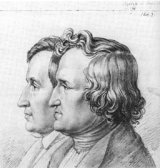The Juniper-Tree Page #2
"The Juniper-Tree" by The Brothers Grimm is a chilling yet engrossing fairy tale about a boy who is killed by his wicked stepmother and then turned into a bird by her. His faithful sister buries his bones beneath the family's juniper tree, where he reincarnates into a bird who sings an enchanting song revealing the truth of his death. The narrative ends with the stepmother's death due to a millstone dropped on her by the bird, while the boy is returned to his human form to live happily with his father and sister. The story is steeped in Brothers Grimm's typical dark and eerie storytelling, yet carries an allegorical message of bravery, truth, and familial love.
could no more be seen, the juniper-tree stood there as before, and the silk handkerchief and the bones were gone. Little Marleen now felt as lighthearted and happy as if her brother were still alive, and she went back to the house and sat down cheerfully to the table and ate. The bird flew away and alighted on the house of a goldsmith and began to sing: ‘My mother killed her little son; My father grieved when I was gone; My sister loved me best of all; She laid her kerchief over me, And took my bones that they might lie Underneath the juniper-tree Kywitt, Kywitt, what a beautiful bird am I!’ The goldsmith was in his workshop making a gold chain, when he heard the song of the bird on his roof. He thought it so beautiful that he got up and ran out, and as he crossed the threshold he lost one of his slippers. But he ran on into the middle of the street, with a slipper on one foot and a sock on the other; he still had on his apron, and still held the gold chain and the pincers in his hands, and so he stood gazing up at the bird, while the sun came shining brightly down on the street. ‘Bird,’ he said, ‘how beautifully you sing! Sing me that song again.’ ‘Nay,’ said the bird, ‘I do not sing twice for nothing. Give that gold chain, and I will sing it you again.’ ‘Here is the chain, take it,’ said the goldsmith. ‘Only sing me that again.’ The bird flew down and took the gold chain in his right claw, and then he alighted again in front of the goldsmith and sang: ‘My mother killed her little son; My father grieved when I was gone; My sister loved me best of all; She laid her kerchief over me, And took my bones that they might lie Underneath the juniper-tree Kywitt, Kywitt, what a beautiful bird am I!’ Then he flew away, and settled on the roof of a shoemaker’s house and sang: ‘My mother killed her little son; My father grieved when I was gone; My sister loved me best of all; She laid her kerchief over me, And took my bones that they might lie Underneath the juniper-tree Kywitt, Kywitt, what a beautiful bird am I!’ The shoemaker heard him, and he jumped up and ran out in his shirt-sleeves, and stood looking up at the bird on the roof with his hand over his eyes to keep himself from being blinded by the sun. ‘Bird,’ he said, ‘how beautifully you sing!’ Then he called through the door to his wife: ‘Wife, come out; here is a bird, come and look at it and hear how beautifully it sings.’ Then he called his daughter and the children, then the apprentices, girls and boys, and they all ran up the street to look at the bird, and saw how splendid it was with its red and green feathers, and its neck like burnished gold, and eyes like two bright stars in its head. ‘Bird,’ said the shoemaker, ‘sing me that song again.’ ‘Nay,’ answered the bird, ‘I do not sing twice for nothing; you must give me something.’ ‘Wife,’ said the man, ‘go into the garret; on the upper shelf you will see a pair of red shoes; bring them to me.’ The wife went in and fetched the shoes. ‘There, bird,’ said the shoemaker, ‘now sing me that song again.’ The bird flew down and took the red shoes in his left claw, and then he went back to the roof and sang: ‘My mother killed her little son; My father grieved when I was gone; My sister loved me best of all; She laid her kerchief over me, And took my bones that they might lie Underneath the juniper-tree Kywitt, Kywitt, what a beautiful bird am I!’ When he had finished, he flew away. He had the chain in his right claw and the shoes in his left, and he flew right away to a mill, and the mill went ‘Click clack, click clack, click clack.’ Inside the mill were twenty of the miller’s men hewing a stone, and as they went ‘Hick hack, hick hack, hick hack,’ the mill went ‘Click clack, click clack, click clack.’ The bird settled on a lime-tree in front of the mill and sang: ‘My mother killed her little son; then one of the men left off, My father grieved when I was gone; two more men left off and listened, My sister loved me best of all; then four more left off, She laid her kerchief over me, And took my bones that they might lie now there were only eight at work, Underneath And now only five, the juniper-tree. And now only one, Kywitt, Kywitt, what a beautiful bird am I!’ then he looked up and the last one had left off work. ‘Bird,’ he said, ‘what a beautiful song that is you sing! Let me hear it too; sing it again.’ ‘Nay,’ answered the bird, ‘I do not sing twice for nothing; give me that millstone, and I will sing it again.’ ‘If it belonged to me alone,’ said the man, ‘you should have it.’ ‘Yes, yes,’ said the others: ‘if he will sing again, he can have it.’ The bird came down, and all the twenty millers set to and lifted up the stone with a beam; then the bird put his head through the hole and took the stone round his neck like a collar, and flew back with it to the tree and sang-- ‘My mother killed her little son; My father grieved when I was gone; My sister loved me best of all; She laid her kerchief over me, And took my bones that they might lie Underneath the juniper-tree Kywitt, Kywitt, what a beautiful bird am I!’ And when he had finished his song, he spread his wings, and with the chain in his right claw, the shoes in his left, and the millstone round his neck, he flew right away to his father’s house. The father, the mother, and little Marleen were having their dinner. ‘How lighthearted I feel,’ said the father, ‘so pleased and cheerful.’ ‘And I,’ said the mother, ‘I feel so uneasy, as if a heavy thunderstorm were coming.’ But little Marleen sat and wept and wept. Then the bird came flying towards the house and settled on the roof. ‘I do feel so happy,’ said the father, ‘and how beautifully the sun shines; I feel just as if I were going to see an old friend again.’ ‘Ah!’ said the wife, ‘and I am so full of distress and uneasiness that my teeth chatter, and I feel as if there were a fire in my veins,’ and she tore open her dress; and all the while little Marleen sat in the corner and wept, and the plate on her knees was wet with her tears. The bird now flew to the juniper-tree and began singing: ‘My mother killed her little son; the mother shut her eyes and her ears, that she might see and hear nothing, but there was a roaring sound in her ears like that of a violent storm, and in her eyes a burning and flashing like lightning: My father grieved when I was gone; ‘Look, mother,’ said the man, ‘at the beautiful bird that is singing so magnificently; and how warm and bright the sun is, and what a delicious scent of spice in the air!’ My sister loved me best of all; then little Marleen laid her head down on her knees and sobbed. ‘I must go outside and see the bird nearer,’ said the man. ‘Ah, do not go!’ cried the wife. ‘I feel as if the whole house were in flames!’ But the man went out and looked at the bird. She laid her kerchief over me,
Translation
Translate and read this book in other languages:
Select another language:
- - Select -
- 简体中文 (Chinese - Simplified)
- 繁體中文 (Chinese - Traditional)
- Español (Spanish)
- Esperanto (Esperanto)
- 日本語 (Japanese)
- Português (Portuguese)
- Deutsch (German)
- العربية (Arabic)
- Français (French)
- Русский (Russian)
- ಕನ್ನಡ (Kannada)
- 한국어 (Korean)
- עברית (Hebrew)
- Gaeilge (Irish)
- Українська (Ukrainian)
- اردو (Urdu)
- Magyar (Hungarian)
- मानक हिन्दी (Hindi)
- Indonesia (Indonesian)
- Italiano (Italian)
- தமிழ் (Tamil)
- Türkçe (Turkish)
- తెలుగు (Telugu)
- ภาษาไทย (Thai)
- Tiếng Việt (Vietnamese)
- Čeština (Czech)
- Polski (Polish)
- Bahasa Indonesia (Indonesian)
- Românește (Romanian)
- Nederlands (Dutch)
- Ελληνικά (Greek)
- Latinum (Latin)
- Svenska (Swedish)
- Dansk (Danish)
- Suomi (Finnish)
- فارسی (Persian)
- ייִדיש (Yiddish)
- հայերեն (Armenian)
- Norsk (Norwegian)
- English (English)
Citation
Use the citation below to add this book to your bibliography:
Style:MLAChicagoAPA
"The Juniper-Tree Books." Literature.com. STANDS4 LLC, 2024. Web. 21 Dec. 2024. <https://www.literature.com/book/the_juniper-tree_2107>.




Discuss this The Juniper-Tree book with the community:
Report Comment
We're doing our best to make sure our content is useful, accurate and safe.
If by any chance you spot an inappropriate comment while navigating through our website please use this form to let us know, and we'll take care of it shortly.
Attachment
You need to be logged in to favorite.
Log In